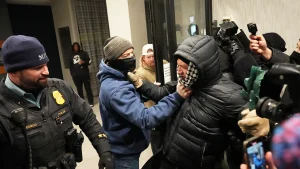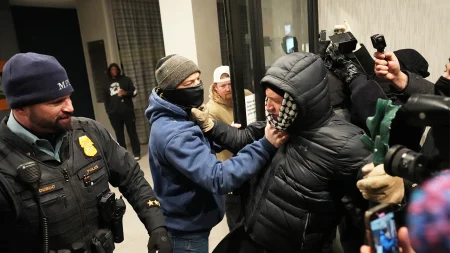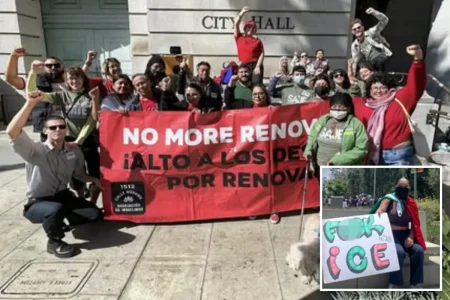Russia’s Intensifying Crackdown: The Legal Assault Against Navalny’s Opposition Movement
The Shadow of Repression Grows Longer After Kremlin Critic’s Death
In the frigid landscape of Russian politics, the apparatus of state power has turned with renewed vigor against the movement once led by Alexei Navalny, the prominent opposition figure whose death in a remote Arctic penal colony last February sent shockwaves through international diplomatic circles and human rights communities. What began years ago as targeted pressure against a singular voice of dissent has evolved into a systematic dismantling of Russia’s most significant opposition network, with authorities employing an increasingly expansive legal arsenal to silence remaining activists, supporters, and organizations associated with Navalny’s legacy.
The crackdown, which observers describe as unprecedented even by post-Soviet Russia’s restrictive standards, has manifested through a series of calculated legal maneuvers: designating Navalny’s Anti-Corruption Foundation as an “extremist organization” (placing it in the same legal category as terrorist groups); labeling dozens of opposition figures as “foreign agents”; and pursuing criminal cases against former staff members on charges ranging from establishing an “extremist community” to spreading “false information” about the Russian military. Leonid Volkov, Navalny’s former chief of staff who fled Russia in 2019, described the situation as “a legal steamroller designed to crush any remaining organized opposition.” The Kremlin’s approach appears methodical—first isolating Navalny himself through imprisonment and now, following his death, systematically disassembling the movement he built through legislative and judicial mechanisms that provide a veneer of legality to political repression.
From Individual Target to Systematic Dismantling: The Evolution of State Tactics
What distinguishes the current wave of repression from previous efforts is both its scope and methodology. Prior to Navalny’s death, authorities primarily targeted him personally, alongside a handful of his closest associates. Today, the legal dragnet has widened considerably to encompass volunteers, donors, social media supporters, and even citizens who merely shared content from Navalny-affiliated platforms. “The message is clear: any association, however peripheral, with Navalny’s movement carries serious legal jeopardy,” explained Maria Kuznetsova, a political analyst with the Carnegie Endowment for International Peace. Court records reviewed by independent media outlets reveal that since February 2023, over 300 individuals have faced administrative penalties for displaying Navalny’s symbols or slogans, while at least 74 criminal cases have been initiated against people associated with his organizations—a significant escalation from the approximately 30 such cases in the preceding three years combined.
The legal architecture enabling this crackdown has been methodically constructed. Beginning in June 2021, when Russian courts formally banned Navalny’s organizations as “extremist,” authorities gained expansive powers to prosecute not just leaders but ordinary supporters. The subsequent passage of increasingly restrictive laws concerning “foreign agents,” “undesirable organizations,” and “discrediting the armed forces” (following the Ukraine invasion) created an interlocking legal framework that effectively criminalizes most forms of opposition activity. The case of Ksenia Fadeeva illustrates this approach: once the head of Navalny’s Tomsk office and an elected city council member, she was sentenced in December to nine years in a penal colony for “creating an extremist community”—essentially for continuing routine political organizing after the extremist designation. Her case represents dozens of similar prosecutions targeting regional coordinators who once formed the backbone of Navalny’s nationwide network.
Digital Persecution: The Online Frontier of Political Repression
The Kremlin’s campaign extends beyond traditional legal measures into the digital realm, where authorities have deployed sophisticated technologies and legal instruments to identify and prosecute online supporters. Roskomnadzor, Russia’s telecommunications regulator, has blocked hundreds of websites connected to Navalny’s movement, while requiring social media platforms to remove content related to his organizations. More concerning to human rights defenders is the growing use of digital surveillance to identify citizens who interact with opposition content online. “We’ve documented numerous cases where individuals were detained based solely on their social media activity—liking posts from Navalny’s team, sharing videos from his YouTube channels, or even just commenting on related news stories,” said Pavel Chikov, head of the Agora Human Rights Group.
The case of Dmitry Ostrovsky, a 28-year-old IT specialist from Kazan with no previous political activism, exemplifies this trend. In March, he received a three-year suspended sentence for “participating in an extremist organization” after authorities determined he had donated 1,000 rubles (approximately $10) to Navalny’s team two years prior and had shared several of their corruption investigation videos on his VK social media page. Court documents in his case referenced IP address tracking and banking transaction monitoring as evidence, highlighting the sophisticated surveillance methods deployed against ordinary citizens. Similar cases have emerged across Russia, creating what Tatiana Stanovaya, founder of the R.Politik analysis firm, calls “a climate of digital fear” designed to prevent Russians from engaging with opposition content even passively. “The goal is to make the cost of any association with Navalny prohibitively high,” Stanovaya noted. “When average citizens face criminal prosecution for a social media like or a small donation, it sends a powerful deterrent message.”
The International Dimension: Exile, Extraterritorial Persecution, and Global Response
For many leading figures in Navalny’s movement, exile has become the only alternative to imprisonment. From locations across Europe, the United States, and the Baltic states, these activists continue their work through digital channels—maintaining YouTube channels, organizing online events, and coordinating with international organizations. However, the Kremlin’s reach has extended beyond Russia’s borders, with exiled opposition members facing significant challenges. In October, Lithuania-based Ivan Zhdanov and Leonid Volkov were sentenced in absentia to 12 and 11 years in prison, respectively. Russian authorities have issued international warrants for their arrest through Interpol, though most Western nations have rejected these requests as politically motivated.
The global response to Russia’s crackdown has been mixed. While Western governments have issued strong condemnations and imposed targeted sanctions on officials involved in Navalny’s persecution and subsequent death, these measures have failed to significantly influence the Kremlin’s domestic policies. The European Parliament adopted a resolution in March calling for increased support for Russian opposition forces and stronger sanctions against those responsible for political repression. Meanwhile, human rights organizations including Amnesty International and Human Rights Watch have documented the deteriorating situation, classifying many opposition figures as “prisoners of conscience” and calling for their immediate release. Despite these efforts, the practical impact remains limited. “International pressure is important for maintaining visibility of these cases and providing some support to those targeted,” explained Vladimir Kara-Murza, another opposition figure who survived poisoning attempts before being imprisoned for 25 years on treason charges, speaking through his attorney. “But we must be realistic about its ability to fundamentally alter the Kremlin’s approach to internal dissent, especially in the current geopolitical context.”
The Future of Russian Opposition: Adaptation, Resilience, and Long-term Prospects
Despite the intensity of the crackdown, Navalny’s movement has demonstrated remarkable adaptability. Following his death and the intensified legal persecution, the opposition has restructured its approach—shifting from centralized organization to more diffuse networks, embracing encrypted communications, and developing new methods for circumventing state censorship. The Anti-Corruption Foundation, now operating from exile, continues publishing investigative reports on corruption among Russian elites, reaching millions through YouTube and Telegram despite domestic blocks. A new initiative called “Navalny’s Headquarters” launched in April focuses on coordinating grassroots activism and providing legal support to those facing persecution.
The long-term prospects for Russia’s opposition movement remain uncertain. The current wave of repression has effectively eliminated organized opposition within Russia’s borders, forcing the movement to operate primarily from exile with limited domestic presence. Yet historical precedents suggest such periods of intense repression often contain the seeds of future political transformation. “What we’re witnessing is not just the suppression of Navalny’s specific movement, but an attempt to eliminate the very concept of organized political opposition in Russia,” said Ekaterina Schulmann, a political scientist now based in Germany. “However, the underlying societal demands for accountability, rule of law, and political representation won’t disappear simply because their advocates are silenced.” As the legal assault continues, the ultimate test for Navalny’s movement will be its ability to maintain relevance and connection with ordinary Russians while operating under unprecedented constraints. Despite the grim current reality, many activists maintain a long view. As Yulia Navalnaya, who has assumed a leadership role following her husband’s death, stated in a recent address: “Regimes built on repression and fear may appear strong, but history teaches us they carry the elements of their own undoing. Our work continues because the Russia we believe in—democratic, just, and free—remains not just possible but inevitable.”










